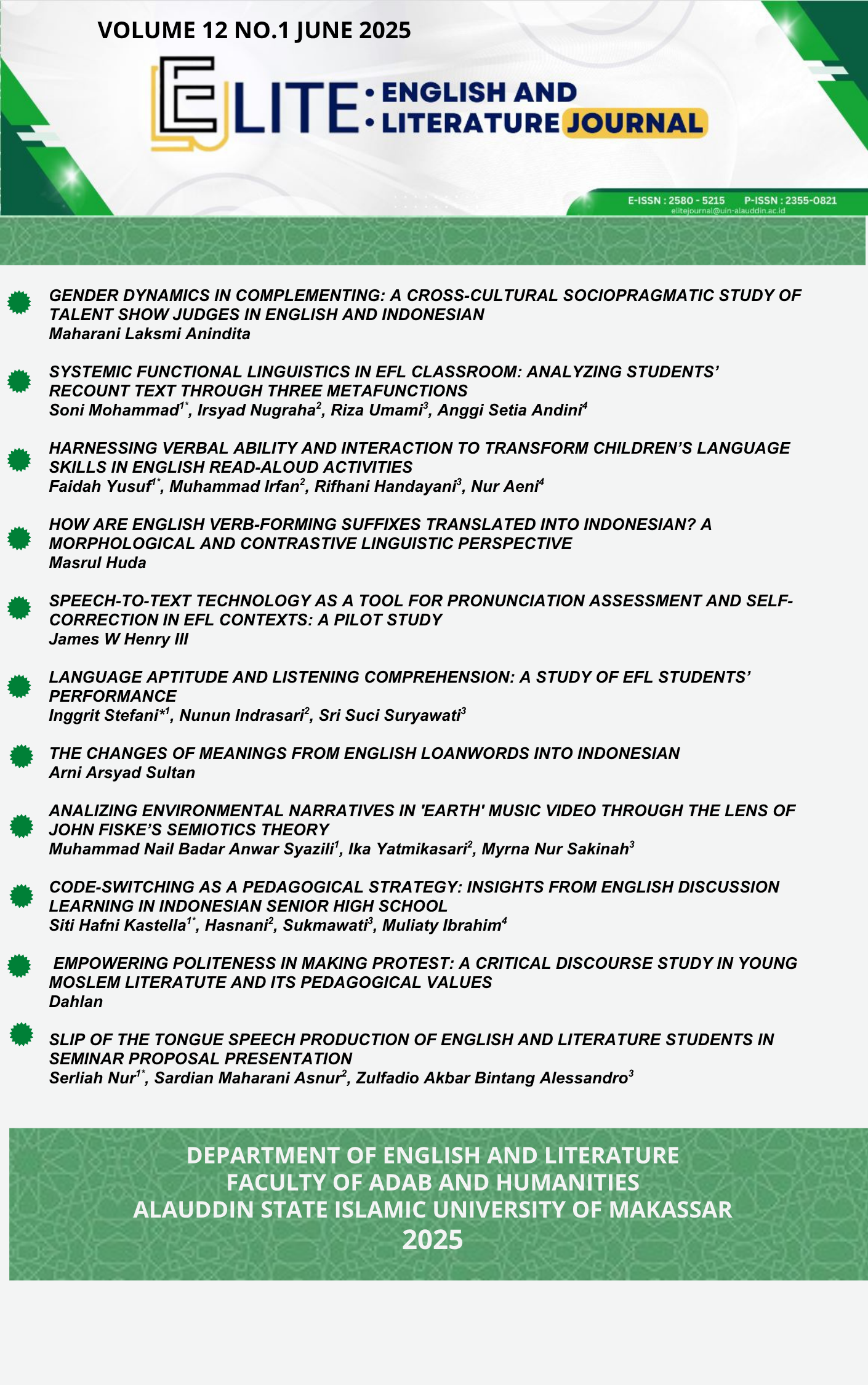NEEDS ANALYSIS FOR THE DEVELOPMENT OF A UNITY-BASED EDUCATIONAL GAME APPLICATION ON THE FAVOURITE FOOD AND DRINKS TOPIC AT SMP NEGERI 2 SUNGAI LILIN
DOI:
https://doi.org/10.24252/elite.v12i1.62730Keywords:
Need Analysis, , Educational Game, Unity, English Learning, Fovorite Food and DrinksAbstract
This study aims to analyze the needs for developing a Unity-based educational game on the topic Favourite Food and Drinks in English language learning at SMP Negeri 2 Sungai Lilin. A descriptive qualitative approach was employed, involving two English teachers and 60 seventh-grade students as research subjects. Data were collected through interviews, observations, and needs analysis questionnaires, and analyzed using descriptive qualitative and simple quantitative methods. The findings reveal that the learning process is still dominated by conventional media such as textbooks and PowerPoint presentations, which have not effectively enhanced students’ motivation and active participation. Both teachers and students showed a high level of enthusiasm toward the use of interactive educational game-based learning media. The questionnaire results indicated an average needs score of 83.96%, categorized as very high, with the aesthetic aspect receiving the highest score (89.2%). These findings confirm that educational game-based media are highly relevant to improve students’ vocabulary mastery and communicative abilities. Therefore, the development of a Unity-based educational game is recommended as an innovative solution to create interactive, engaging, and meaningful English learning in the digital era.
Downloads
References
Aji, S. D., Hakim, A. R., Novita, K. M., & Hudha, M. N. (2023). Unity-Engine-Based E-Module to Increase Learning Results on Online Learning. AL-ISHLAH: Jurnal Pendidikan, 15(4), 5886–5892. https://doi.org/10.35445/alishlah.v15i4.4590
Andriani, A., Dewi, N. S. N., & Wijayanti, A. (2024). Junior High School English Teachers’ Perception on Games- Based English Vocabulary Teaching. Jurnal Teknologi Pendidikan (JTP), 23(1), 46–67. https://doi.org/10.24114/jtp.v8i2.3329
Aprilia, N., Syahril, S., & Azhar, A. (2024). Needs Analysis for the Development of Blended Learning Media Based on PBL to Improve Critical Thinking Skills. Jurnal Paedagogy, 11(1), 186. https://doi.org/10.33394/jp.v11i1.9934
Bakti, K. N. N. (2017). Vocabulary Learning Strategies Used by Junior High School Students. Indonesian Journal of English Language Studies (IJELS), 3(2), 44–59. https://doi.org/10.24071/ijels.v3i2.1064
Bastian, A., Firdaus, M., & Rizky, R. (2023). The School Readiness in Implementing the Merdeka Curriculum in Pekanbaru : A Survey of Teachers and Students’ Perspectives. Jurnal Kependidikan: Jurnal Hasil Penelitian Dan Kajian Kepustakaan Di Bidang Pendidikan, Pengajaran Dan Pembelajaran, 9(4), 1162–1173.
Camacho-Sánchez, R., Rillo-Albert, A., & Lavega-Burgués, P. (2022). Gamified Digital Game-Based Learning as a Pedagogical Strategy: Student Academic Performance and Motivation. Applied Sciences (Switzerland), 12(21). https://doi.org/10.3390/app122111214
Fadillah, E. F., Nasrullah, N., & Muth’im, A. (2023). The use of video games on vocabulary learning in English as second language context. IDEAS Journal of Language Teaching and Learning Linguistics and Literature, 11(2), 1876–1885. https://doi.org/10.24256/ideas.v11i2.4802
Haleem, A., Javaid, M., Qadri, M. A., & Suman, R. (2022). Understanding the role of digital technologies in education: A review. Sustainable Operations and Computers, 3(May), 275–285. https://doi.org/10.1016/j.susoc.2022.05.004
Harlinda, A., & Suratmi. (2024). Needs Analysis As the First Step of Articulate Storyline Assisted Learning Media Development. Jurnal Cakrawala Pendas, 10(3), 446–457. https://doi.org/10.31949/jcp.v10i3.9082
Hu, Y., Gallagher, T., Wouters, P., van der Schaaf, M., & Kester, L. (2022). Game-based learning has good chemistry with chemistry education: A three-level meta-analysis. Journal of Research in Science Teaching, 59(9), 1499–1543. https://doi.org/10.1002/tea.21765
Downloads
Published
How to Cite
Issue
Section
License
Copyright (c) 2025 Zulhaidir, Syarifuddin, Machdalena Vianty

This work is licensed under a Creative Commons Attribution-NonCommercial-ShareAlike 4.0 International License.
Once an article was published in the journal, the author(s) are:
granted to the journal right licensed under Creative Commons License Attribution that allows others to share the work with an acknowledgement of the work's authorship.
permitted to publish their work online in third parties as it can lead wider dissemination of the work.
continue to be the copyright owner and allow the journal to publish the article with the CC BY-NC-SA 4.0 license
receiving a DOI (Digital Object Identifier) of the work.













